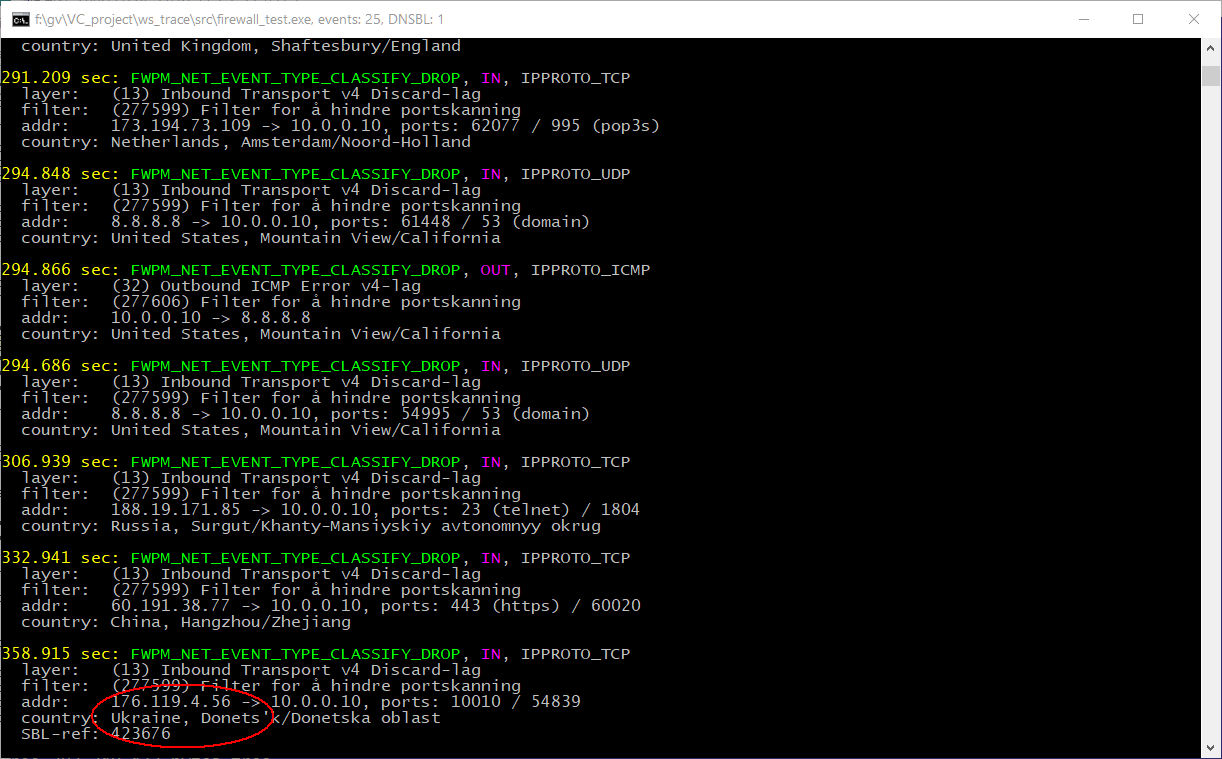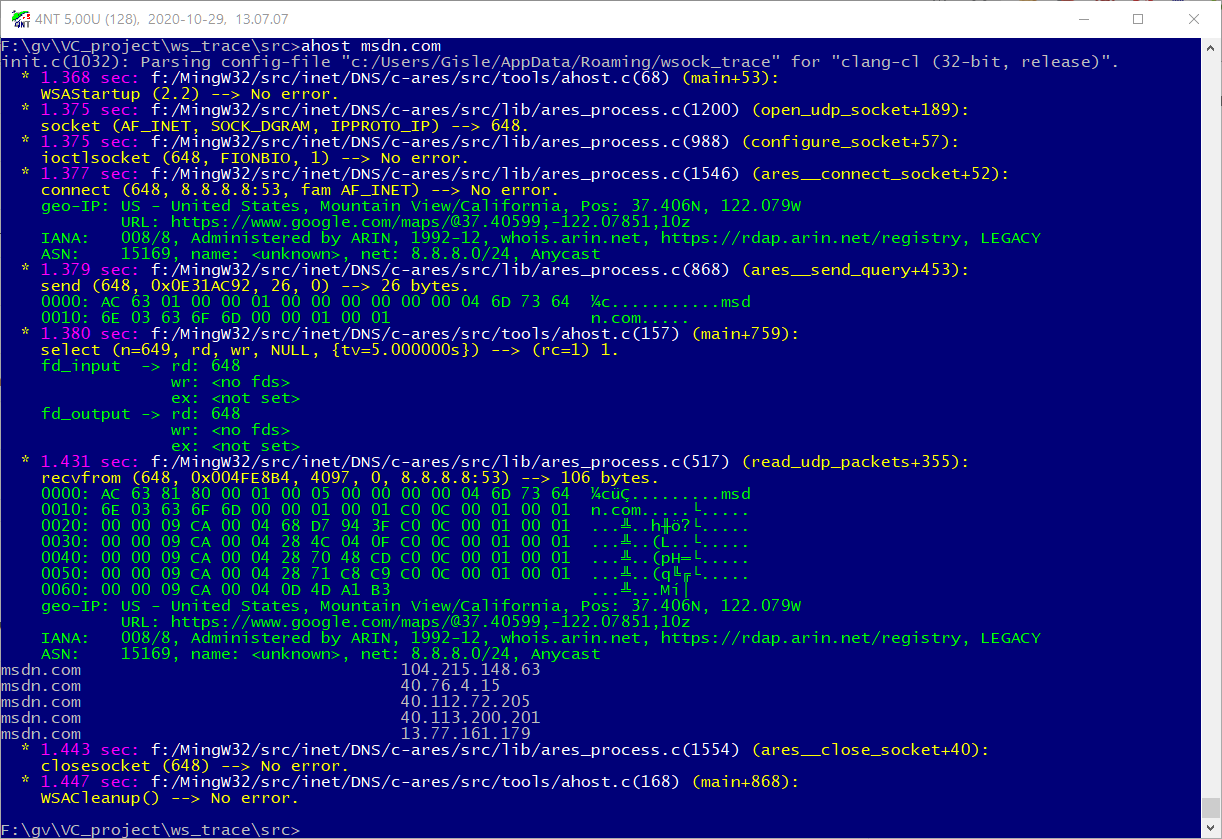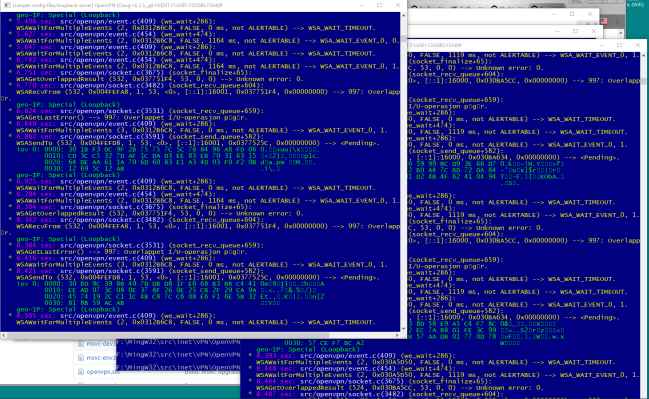A drop-in tracing library / DLL for most normal Winsock calls.
It sits between your program and the Winsock library (ws2_32.dll).
It works best for MSVC since the stack-walking code requires the program's
PDB symbol-file to be present. And unfortunately MinGW/CygWin doesn't produce
PDB-symbols (GNU-debugger instead relies on the archaic BFD library). So currently,
the MinGW and CygWin targets will only show raw addresses for the traced
functions.
A MSVC example output from c:\> ahost msdn.com showing all the addresses of msdn.com
(ahost is part of the DNS library C-ares):
-
Colourised trace of the Winsock calls with function parameters and return values. The colours are configurable.
-
Runtime caller information: Using Microsoft's dbghelp (or psapi) APIs together with the programs PDB-file, the filename, line-number of the calling function-name is shown. In the above example,
WSAStartup()is called fromahost.c, line 68. Which should be 53 bytes into themain()function. This should be here. -
Precise Timestamps: All trace-lines starts with a precise timestamp obtained from
QueryPerformanceCounter().
The timestamp is controlled bytrace_timein thewsock_traceconfig-file. -
Extension functions: Winsock has several Microsoft-specific extension functions (like
AcceptEx()andConnectEx()). Wsock-trace is able to trace these too. -
IP-Country information thanks to the MaxMind Lite databases. Thanks to the Tor-project for a simplified CSV version of these MaxMind GeoIP-databases. (using the CSV files
GeoIP.csvandGeoIP6.csvare always enabled). -
IP-Location information (City and Region) from IP2Location. The above
Mountain View/Californiais Google's well-known location. Many thanks to IP2Location [3] for their data-bases. -
ASN information (Autonomous System Number) from IPFire.
The screen-shot above shows Google has ASN 15169 (for their DNS server-address8.8.8.8).
More details for that ASN is at DNSlytics and even more details at PeerDB. Many thanks to the IPFire developers [4] for their data-bases. -
Domain Name System-based Blackhole List (DNSBL) support: with the help of DROP-files from the Spamhaus project, it can detect IPv4 / IPv6-addresses uses by spammers and cyber-criminals. The more potent Spamhaus BGPf / BCL is on the to-do list.
-
Slowdown; For testing too fast programs, all receive, transmit,
select()andWSAPoll()calls can be delayed a number of milli-seconds. E.g. slowing down arecv()call is controlled byrecv_delay = 0inwsock_traceconfig-file. -
Firewall activity; report activity causing events from the Window Filtering Platform (the Internet Connection Firewall; ICF). See below.
-
LuaJIT script support is very preliminary at the moment. The idea is that
.luascripts could change the behaviour of Wsock-trace at runtime without rebuilding it. Only the absolute minimum of the needed files are in ./LuaJIT. Goto here for the complete LuaJIT.
The following assumes you will install this package in c:\prog\wsock_trace.
To clone this repository, do this in an empty c:\prog\wsock_trace directory:
c:\prog\wsock_trace> git clone https://github.com/gvanem/wsock-trace.git .
To be able to get more precise Geo-IP information for addresses (city and region), Wsock-trace will use a IP2Location LITE database. To make best use of it, do this:
- Sign-up for an account and download a free IP2Location LITE database. Or in case you have an account, go here.
- Download and use a file named like
IP2LOCATION-LITE-DBx.IPV6.BIN.
Such a file contains both IPv4 and IPv6 records. Adownload-ip2loc.batlike this could do it automatically:@echo off setlocal :: :: Fill in this from the login-page :: if %IP2LOCATION_TOKEN. == . set IP2LOCATION_TOKEN=xxxx curl --output IP2LOCATION-LITE-DB11.IPV6.BIN.zip ^ "https://www.ip2location.com/download/?token=%IP2LOCATION_TOKEN%&file=DB11LITEBINIPV6" unzip IP2LOCATION-LITE-DB11.IPV6.BIN.zip - Copy
IP2LOCATION-LITE-DBx.IPV6.BINinto your%APPDATA%directory and edit the keyword in the[geoip]section to read:
ip2location_bin_file = %APPDATA%\IP2LOCATION-LITE-DBx.IPV6.BIN
Note: IP2Location-C-Library
is no longer used as a submodule (since I've made several local changes to it). It has been
merged into src/ip2loc.c and simplified.
Enter the src sub-directory and do the respective make allcommand.
If the all command succeeded, you can do the respective make install command:
| Builder | make allcommand |
make install result |
|---|---|---|
| CygWin | make -f Makefile.CygWin | cp wsock_trace_cyg*.dll to /usr/bin andcp libwsock_trace_cyg*.a to /usr/lib |
| MinGW32 | make -f Makefile.MinGW | cp wsock_trace_mw.dll to $(MINGW32)/bin andcp libwsock_trace_mw*.a to $(MINGW32)/lib |
| MSVC | nmake -f makefile.vc6 | copy wsock_trace*.dll to %VCINSTALLDIR%\bin andcopy wsock_trace.lib to %VCINSTALLDIR%\lib |
Notes:
- For a
WIN32build, the above files will have an-x86suffix. - For a
WIN64build, the above files will have an-x64suffix. - And for a
USE_CRT_DEBUG = 1build, the above files will have an extra_dsuffix. - So for a MinGW,
WIN64debug-build, the files are namedwsock_trace_mw_d-x64.dllandlibwsock_trace_mw_d-x64.a.
Link with one of these libraries (instead of the default libws32_2.a or ws2_32.lib):
| Builder | Platform | Library |
|---|---|---|
| CygWin | x86 |
libwsock_trace_cyg-x86.a |
| CygWin | x64 |
libwsock_trace_cyg-x64.a |
| MinGW | x86 |
libwsock_trace_mw-x86.a |
| MinGW | x64 |
libwsock_trace_mw-x64.a |
| MSVC | x86 |
wsock_trace-x86.lib |
| MSVC | x64 |
wsock_trace-x64.lib |
Thus most normal Winsock calls are traced on entry and exit.
Example screen-shot above or details in Running samples below.
MSVC: Remember to compile using -Zi
to produce debug-symbols. For MSVC-2015 (or newer) it is recomended to use option
-Zo
too (which will eases the debug of optimised code. And remember to use -debug when linking your program.
See src/Makefile.vc6 for an example.
It is not adviced to use option -Oy
(enable frame pointer omission) since that will make it difficult for StackWalk64()
to figure out the filename and line of the calling function.
The trace-level and other settings are controlled by a config-file
wsock_trace. This file is searched along these places until found:
- The file pointed to by
%WSOCK_TRACE. - The current directory.
- Then finally the
%APPDATA%directory.
wsock_trace is read in init.c
at startup. Read it's contents; the comments therein should be self-explanatory.
If wsock_trace is not found in one of the above directories, the default
trace_level is set to 1.
There is currently no install.bat file for Wsock-trace. So you should copy the following files (here at GitHub)
to your %APPDATA% directory:
wsock_trace
GeoIP.csv
GeoIP6.csv
GeoIPASNum.csv
IPv4-address-space.csv
IPv6-unicast-address-assignments.csv
DROP.txt
EDROP.txt
DROPv6.txt
IPFire-database.db
These environment variables are on the form:
<drive>:\Documents and Settings\<User Name>\ProgramData. (Win-XP)<drive>:\Users\<User Name>\AppData\Roaming. (Win-Vista+)
All the below samples uses these %APPDATA%/wsock_trace settings:
compact = 1trace_time = noneanduse_short_path = 1.
Example output from src/ws_tool.exe test (built with MSVC):
* ws_trace/test.c(45) (main+50): WSAStartup (2.2) --> No error.
* ws_trace/test.c(24) (do_wsock_tests+125): gethostbyaddr (127.0.0.1, 4, AF_INET) --> 0x003C8780.
* ws_trace/test.c(27) (do_wsock_tests+150): gethostbyaddr (0.0.0.0, 4, AF_INET) --> 0x003C8780.
* ws_trace/test.c(29) (do_wsock_tests+164): gethostbyaddr (::1, 16, AF_INET6) --> 0x003C8780.
* ws_trace/test.c(31) (do_wsock_tests+175): gethostbyname (localhost) --> 0x003C8780.
* ws_trace/test.c(31) (do_wsock_tests+187): socket (AF_INET, SOCK_STREAM, 0) --> 1724.
* ws_trace/test.c(33) (do_wsock_tests+196): WSAGetLastError() --> No error.
* ws_trace/test.c(36) (do_wsock_tests+343): select (n=0-1724, rd, NULL, NULL, {tv=1.000001s}) --> No error.
* ws_trace/test.c(37) (do_wsock_tests+358): FD_ISSET (1724, fd) --> 0.
* ws_trace/test.c(47) (main+61): WSACleanup() --> No error.
^ ^ ^ ^
| | | |___ The traced Winsock function and the result.
| | |
| | |____ The calling function with displacement (i.e. offset from
| | (nearest public symbol).
| |_____ Line number in src-file.
|
|____ Source-file relative of the application.Here is a more realistic and useful example with wsock_trace.lib linked to
Nmap [1]:
c:\> nmap -sT -P0 -p23,80 10.0.0.1
* mswin32/winfix.cc(134) (win_pre_init+68): WSAStartup (2.2) --> No error.
Starting Nmap 6.02 ( http://nmap.org ) at 2012-07-24 12:48 CET
* g:/vc_2010/sdk/include/wspiapi.h(1011) (WspiapiGetAddrInfo+79): WSASetLastError (0).
* g:/vc_2010/sdk/include/wspiapi.h(1011) (WspiapiGetAddrInfo+79): WSASetLastError (0).
* g:/vc_2010/sdk/include/wspiapi.h(1011) (WspiapiGetAddrInfo+79): WSASetLastError (0).
* g:/vc_2010/sdk/include/wspiapi.h(1011) (WspiapiGetAddrInfo+79): WSASetLastError (0).
* g:/vc_2010/sdk/include/wspiapi.h(1011) (WspiapiGetAddrInfo+79): WSASetLastError (0).
* g:/vc_2010/sdk/include/wspiapi.h(1011) (WspiapiGetAddrInfo+79): WSASetLastError (0).
* scan_engine.cc(3002) (sendConnectScanProbe+266): socket (AF_INET, SOCK_STREAM, 6) --> 1780.
* nbase/nbase_misc.c(261) (unblock_socket+65): ioctlsocket (1780, FIONBIO, 1) --> No error.
* scan_engine.cc(2964) (init_socket+82): setsockopt (1780, SOL_SOCKET, SO_LINGER, 1, 4) --> No error.
* libnetutil/netutil.cc(856) (set_ttl+34): setsockopt (1780, IPPROTO_IP, IP_TTL, ULONG_MAX, 4) --> WSAEINVAL: Invalid arguments (10022).
* scan_engine.cc(3021) (sendConnectScanProbe+599): connect (1780, 10.0.0.1:23) --> WSAEWOULDBLOCK: Call would block (10035).
* nbase/nbase_misc.c(133) (socket_errno+12): WSAGetLastError() --> WSAEWOULDBLOCK: Call would block (10035).
* scan_engine.cc(922) (ConnectScanInfo::watchSD+82): FD_ISSET (1780, fd) --> 0.
* scan_engine.cc(3002) (sendConnectScanProbe+266): socket (AF_INET, SOCK_STREAM, 6) --> 1720.
* nbase/nbase_misc.c(261) (unblock_socket+65): ioctlsocket (1720, FIONBIO, 1) --> No error.
* scan_engine.cc(2964) (init_socket+82): setsockopt (1720, SOL_SOCKET, SO_LINGER, 1, 4) --> No error.
* libnetutil/netutil.cc(856) (set_ttl+34): setsockopt (1720, IPPROTO_IP, IP_TTL, ULONG_MAX, 4) --> WSAEINVAL: Invalid arguments (10022).
* scan_engine.cc(3021) (sendConnectScanProbe+599): connect (1720, 10.0.0.1:80) --> WSAEWOULDBLOCK: Call would block (10035).
* nbase/nbase_misc.c(133) (socket_errno+12): WSAGetLastError() --> WSAEWOULDBLOCK: Call would block (10035).
* scan_engine.cc(922) (ConnectScanInfo::watchSD+82): FD_ISSET (1720, fd) --> 0.
* scan_engine.cc(3964) (do_one_select_round+473): select (n=0-1780, rd, wr, ex, {tv=0.985000s}) --> 3.
* nbase/nbase_misc.c(133) (socket_errno+12): WSAGetLastError() --> WSAEWOULDBLOCK: Call would block (10035).
* scan_engine.cc(4015) (do_one_select_round+1894): FD_ISSET (1720, fd) --> 0.
* scan_engine.cc(4015) (do_one_select_round+1917): FD_ISSET (1720, fd) --> 1.
* scan_engine.cc(4019) (do_one_select_round+2012): getsockopt (1720, SOL_SOCKET, SO_ERROR, 0, 4) --> No error.
* scan_engine.cc(938) (ConnectScanInfo::clearSD+82): FD_ISSET (1720, fd) --> 1.
* scan_engine.cc(789) (ConnectProbe::~ConnectProbe+37): closesocket (1720) --> No error.
* scan_engine.cc(4015) (do_one_select_round+1894): FD_ISSET (1780, fd) --> 1.
* scan_engine.cc(4019) (do_one_select_round+2012): getsockopt (1780, SOL_SOCKET, SO_ERROR, 0, 4) --> No error.
* scan_engine.cc(938) (ConnectScanInfo::clearSD+82): FD_ISSET (1780, fd) --> 1.
* scan_engine.cc(789) (ConnectProbe::~ConnectProbe+37): closesocket (1780) --> No error.
Nmap scan report for router (10.0.0.1)
Host is up (0.0019s latency).
PORT STATE SERVICE
23/tcp open telnet
80/tcp open http
Nmap done: 1 IP address (1 host up) scanned in 7.61 seconds
* mswin32/winfix.cc(290) (win_cleanup+12): WSACleanup() --> No error.Notes:
- Nmap uses wrong arguments to
setsockopt(); a TTL of ULONG_MAX. - Nmap also calls
WSAStartup()before the startup message. - Notice how Wsock-trace handles (demangles) C++ symbols just
fine thanks to
dbghelp.dllandUnDecorateSymbolName(). I.e. the destructorConnectProbe::~ConnectProbeabove is callingclosesocket()at offset 37. (you can turn off C++ demangling bycpp_demangle = 0in thewsock_traceconfig-file). - Even symbols from a Rust library can be demangled. E.g. from rustls-ffi as used in
libcurl:
This Rust function
* 1.807833 sec: f:/MingW32/src/inet/Crypto/Rustls/src/io.rs(44) (rustls_ffi::io::impl$0::read+32) WSAGetLastError() --> WSAEWOULDBLOCK (10035).rustls_ffi::io::impl$0::readshould be here.
Another example from C-ares's adig.c with the same settings as above:
c:\> adig -t PTR 89.42.216.144
* adig.c(216) (main+105): WSAStartup (2.2) --> No error.
* ares_process.c(1065) (open_udp_socket+248): socket (AF_INET, SOCK_DGRAM, 0) --> 1604.
* ares_process.c(857) (setsocknonblock+61): ioctlsocket (1604, FIONBIO, 1) --> No error.
* ares_process.c(1077) (open_udp_socket+345): connect (1604, 8.8.8.8:53) --> No error.
* ares_process.c(791) (ares__send_query+484): send (1604, 0x00034BDA, 31, 0) --> 31 bytes tx.
* adig.c(397) (main+1780): select (n=0-1604, rd, wr, NULL, {tv=3.109000s}) --> 1.
* ares_process.c(456) (read_udp_packets+146): FD_ISSET (1604, fd) --> 1.
* ares_process.c(485) (read_udp_packets+413): recvfrom (1604, 0x0013F894, 513, 0, 8.8.8.8:53) --> 106 bytes rx.
Domain name not found
id: 58187
flags: qr rd ra
opcode: QUERY
rcode: NXDOMAIN
Questions:
89.42.216.144 . PTR
Answers:
NS records:
. 1413 SOA a.root-servers.net.
nstld.verisign-grs.com.
( 2012072400 1800 900 604800 86400 )
Additional records:
* ares__close_sockets.c(63) (ares__close_sockets+408): closesocket (1604) --> No error.
* adig.c(411) (main+1894): WSACleanup() --> No error.By default, the tracing of htons(),htonl(), ntohs() and ntohl() are
excluded from the trace.
You can edit the %APPDATA%/wsock_trace config-file and exclude whatever calls you like.
And the 2 traces above is showing the effect of the config-value compact = 1.
A more eleborated example from 2 OpenVPN programs; a client and a
server running a simple test (in OpenVPN's root-dir). Started with the vpn.bat snippet:
cd sample
start /pos=200,50,1000,800 ..\openvpn.exe --config sample-config-files/loopback-server
start /pos=800,150,1000,1000 ..\openvpn.exe --config sample-config-files/loopback-client
A Larger version.
The ws_tool.exe firewall program show a screen like:

Together with [DNSBL], enable = 1 it shows remote addresses in SpamHaus DROP-lists.
In this case the address 176.119.4.56
in Ukraine / Donetsk is very active giving a Firewall event approximately every 5 minutes.
A good test of the firewall.c features is to open up your router (create a DMZ) and start a remote
port-scan while ws_tool.exe firewall
is running. You'll see a lot of DROP-events like:
6.700 sec: FWPM_NET_EVENT_TYPE_CLASSIFY_DROP, IN, IPPROTO_TCP
layer: (13) Inbound Transport v4 Discard-layer
filter: (277599) Filter to prevent port-scanning
addr: 204.11.35.98 -> 10.0.0.10, ports: 21 (ftp) / 52115
country: United States, Troy/Michigan
The names of the import libraries and the names of the 32-bit .DLLs are:
- For MSVC:
wsock_trace.libandwsock_trace-x86.dll. - For MinGW:
libwsock_trace.aandwsock_trace_mw-x86.dll. - For CygWin32:
libwsock_trace.aandwsock_trace_cyg-x86.dll.
And the 64-bit equivalents:
- For MSVC:
wsock_trace_x64.libandwsock_trace-x64.dll. - For MinGW:
libwsock_trace_x64.aandwsock_trace_mw-x64.dll. - For CygWin64:
libwsock_trace_x64.aandwsock_trace_cyg-x64.dll.
These DLLs off-course needs to be in current directory or on %PATH. The reason
I've chosen to make it a DLL and not a static-lib is that applications
using wsock_trace*.lib needs not to be re-linked when I do change the inner
workings of the Wsock-trace source code.
As long as the ABI is stable (e.g. not adding new functions to the
wsock_trace-x86.def
file), the application using wsock_trace*.dll should work the same.
Note that some virus scanners may find the behaviour of programs linked to
wsock_trace.lib suspicious.
-
Get the decoding of calling function, file-name and lines in the MinGW/CygWin ports working.
-
LuaJIT-script integration; use a
*.luafile to exclude/include processes and/or functions to trace. -
Injecting
wsock_trace-*.dllinto a remote process. Ref: https://www.viksoe.dk/code/wepmetering.htm. -
Optionally load Wireshark's
libwireshark.dllto dissect transport and application protocols.
Do it for selected processes only. -
Deny certain applications to use
AF_INET6protocols (return-1onsocket(AF_INET6,...)). -
Make it possible to switch network stacks at run-time: select amongst Winsock2, lwIP, SwsSock and/or
Cyclone TCP. -
Make a GUI trace viewer for it. Ref: https://www.viksoe.dk/code/windowless1.htm
-
Add a Json type config feature to support the above features. E.g.:
wireshark_dissect { wget.exe : 1 # Wireshark dissection in wget and curl only. curl.exe : 1 } exclude_trace { select: [curl.exe, wget.exe] # Exclude trace of `select()` and `inet_ntoa()` in curl/wget. inet_ntoa: [curl.exe, wget.exe] htons: [ * ] # Exclude trace of `htons` globally. } deny_ipv6 { pycurl.pyd : 1 # Deny AF_INET6 sockets in scripts using the PyCurl module. python27.dll : 1 # And in other Python scripts too. } stack_mux { use_lwip: [wget2.exe, curl.exe] # Force wget2.exe and curl.exe to use lwIP.dll }
G. Vanem <gvanem@yahoo.no> 2013 - 2023.
-
[1] Nmap; "Network Mapper" is a free and open source (license) utility for network discovery and security auditing.
Ref. https://nmap.org/download.html -
[2] A C library for asynchronous DNS requests (including name resolves)
Ref. https://c-ares.haxx.se/ -
[3] This product includes IP2Location LITE data available from https://lite.ip2location.com.
-
[4] This product includes IPFire location and ASN data available from https://location.ipfire.org/databases/1/.
PS. This file is written with the aid of the Atom editor and it's Markdown-Preview. A real time-saver.

